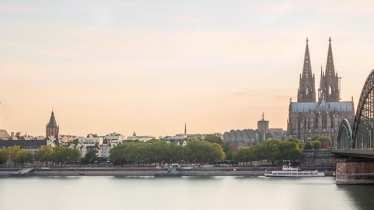
- Destinations
- Cologne
Cologne city break
Famed for its cathedral, Kölsch beer and love of carnival, this sociable city by the Rhine makes for a vibrant city break

Planning your trip to Cologne by train
For a city trip in Europe, Cologne is the ultimate all-rounder. Its calling-card, of course, is its vast Gothic cathedral, which towers above the Old Town – artfully reconstructed after World War II’s devastation. Today, it’s a place of quaint cobbles and historic breweries, along with some outstanding art museums. To really get a sense of the city, though, you’ll need to spend time in its veedels (neighbourhoods) – boutique-hopping in the Belgian Quarter, perhaps, or sampling Südstadt’s food scene. Ready to get underway? Book your train from Brussels to Cologne and arrive in just 1 hour and 50 minutes. Or take the London to Cologne train journey and change in Brussels.
Top sights and attractions
Whatever your ideal city break, a stay in Cologne delivers. For Byzantine treasures, Pop Art-icons and more, hop between the Old Town’s museums, or explore an edgier side of the city in neighbourhoods like Ehrenfeld, known for its graffiti, coffee bars and soaring Central Mosque.
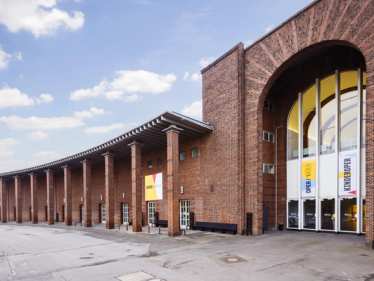
The best things to do
To get the measure of the city, cross the love lock-decked Hohenzollern Bridge to Deutz, where the KölnTriangle’s 29th-floor deck has unrivalled Old-Town views. Head north along the river for the KM 689 Beach Club and the verdant Rheinpark, whose semi-circular Staatenhaus is currently the city’s opera house. From the top of the park, a cable car swoops back across the river, heading to the zoo and Flora Botanical Gardens, whose glasshouses, parterres and lily-dotted ponds are free to visit. For a change of scene, check out Ehrenfeld’s street-art scene, or browse a neighbourhood flea market (Nippes is a favourite with locals).
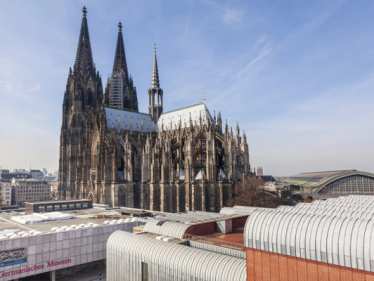
Landmarks and attractions
Cologne’s greatest landmark is its cathedral, the majestic Kölner Dom. Don’t miss the reliquary said to contain the bones of the biblical three kings, or the views from the south tower’s summit, 533 steps up. Next, head to the city hall, carved with saints and monkeys, or take your pick from the city’s 12 Romanesque churches. St Ursula is famed for its bone-filled ‘golden chamber’, while St Cecilia’s – now part of a museum – is filled with medieval art. Near the Chocolate Museum, the waterfront Kranhäuser are more modern icons: a striking glass-and-steel trio, inspired by the harbour’s loading cranes. From here, you can also take a stroll or cruise along the Rhine.
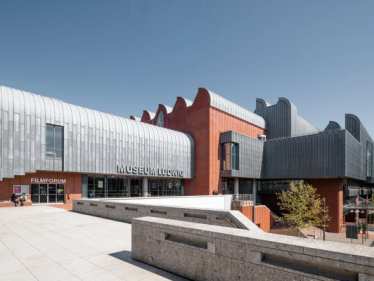
Must-see museums
First, hit the Museum Ludwig. Among its masterpieces, look out for Warhol’s gunslinging Elvis and Rothko’s colour-flooded canvases, along with the world’s third-largest collection of Picassos. The Wallraf-Richartz Museum is home to one of Rembrandt’s last self-portraits, while the MAKK is a showcase for epoch-defining design. Elsewhere, you can sample your way around the Lindt Chocolate Museum, or trace the story of Cologne’s namesake scent at the Farina Fragrance Museum. EL-DE Haus explores the Nazi era in the Gestapo’s former HQ, while the City Museum offers a lively primer on the city’s history. For more ideas – and ticket discounts – check out our partner Musement.
Where to eat, drink and shop
The city’s signature dishes tend to be substantial: think Himmel un Ääd (black pudding, mash and apple sauce) or slow-simmered sauerbraten stew, with a side of potato dumplings. The food scene, though, has moved with the times, with plant-based cafés, style-conscious brunch spots and a firmament of Michelin stars – all covered in our Cologne eating guide. An afternoon’s shopping is one way to work off lunch, whether it’s in Schildergasse’s busy, big-name stores or the Belgian Quarter’s boutiques: head to Schee for screenprints, Magasin Populaire for clothes, and Things We Like for homeware. If a drink’s called for, retreat to one of the city’s iconic brewhouses, or swap your Kölsch for a cocktail at spots like Toddy Tapper, Woods and Samuel’s Shep.
Where to stay in Cologne
The good news? Room rates here are moderate, especially in comparison with cities like Amsterdam or Paris. The Old Town and Belgian Quarter are prime locations, but consider other options too, whether it’s restaurant-dotted Südstadtor hip, laidback Ehrenfeld.
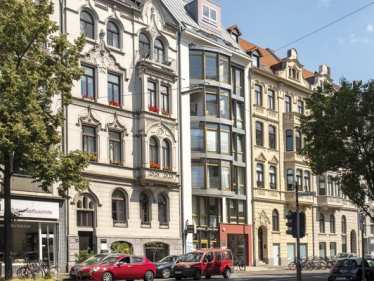
The Belgian Quarter
Cool without being too edgy, the Belgian Quarter (Belgisches Viertel) makes for an appealing base. The Old Town and cathedral are a 20-minute walk away, while the neighbouring Stadtgarten park is a green oasis. At the neighbourhood’s heart, leafy Brüsseler Platz is an all-day hangout, where locals sip coffee by day and beers on summer evenings. The surrounding streets are just as charming, peppered with cafés, small boutiques and elegant art-nouveau apartments. After dark, sample note-perfect cocktails at bars like Little Link, or head to a local eaterie: Ouzeria is hotly tipped, while Belgischer Hof is timelessly romantic.
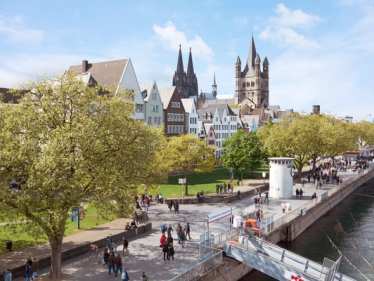
The Altstadt (Old Town)
Decimated by wartime bombs, Cologne’s Old Town rose again, with cobbled lanes framed by gabled houses, reconstructed after the war. Staying here, you’re a short walk from all the big museums – not to mention the cathedral, whose twin spires dominate the skyline. In winter, handsome squares like the Alter Markt host fairylight-strung Christmas Markets, while the river-facing Fischmarkt is lovely year-round, with its cluster of painted houses. The Rhine is close by for strolls along the tree-lined Rheingarten, while eateries run from convivial beer halls to Michelin-tipped tables for two.
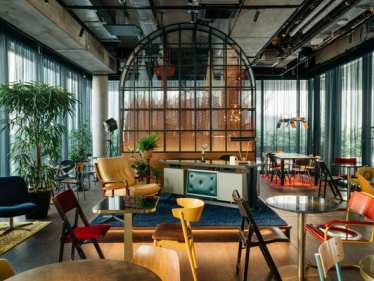
The best hotels for every budget
If location’s top of your list, the Hotel Mondial am Dom Cologne: MGallery delivers – and at very reasonable rates. It’s set facing the Museum Ludwig, with cathedral views from many of its modern, pared-back rooms. More in the mood for marble grandeur? Try the five-star Excelsior Hotel Ernst, on the Dom’s doorstep. Views of the spires come with lower price tags over in Neustadt-Nord, where standouts include the polished Pullman Cologne and 25hours Hotel the Circle; worth a stay for its eighth-floor cocktail bar alone. Finally, south of the Old Town, the Mercure Hotel Severinshof Köln City offers wallet-friendly rates. For more ideas and great deals, check out our full list of partner hotels.
When to do a city break in Cologne?
Spring in Cologne is particularly lovely, as beer gardens hum below the chestnut trees and romantics meander by the Rhine. Summer’s festivals, picnics and lake-swimming segue into the crisp days of autumn, while winters here are magical – especially as Christmas approaches.
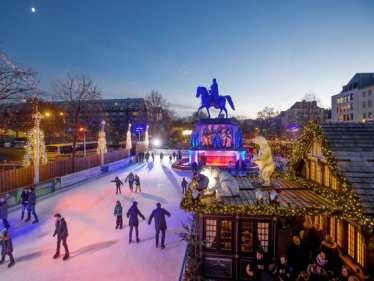
Autumn and Winter in Cologne
In Autumn, head to the botanical gardens for bronze- and scarlet-painted trees, or – in early October – cheer the marathon-runners on, on a looping route that ends at the cathedral. Early November, crisp and cold, brings Museums Night, when over 40 galleries and museums stay open past midnight, with DJs, dancing and bars.
Come the winter, there’s nothing like a Christmas market in Cologne. Clusters of twinkling, glühwein-scented stalls take over the city, while Heumarkt becomes an ice rink, in situ until early January. Next to it, Heinzel’s Wintermärchen spreads across two Old-Town squares, while the tiny, traditional Adventsdorf’s stalls are tucked away by the cathedral.
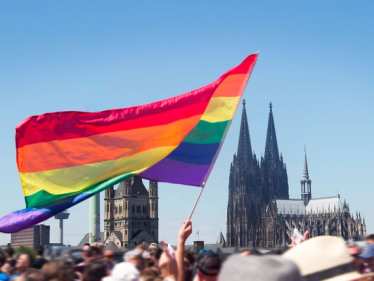
Spring and summer in Cologne
Carnival season in Cologne officially kicks off in November, but the revelry reaches its peak in spring, in the run-up to Easter. On Shrove Monday, don’t miss the Rose Monday parade, with its marching bands and eye-popping floats, which shower the crowds with candy.
Summer, too, has its big-ticket events. On the first weekend in July, rainbow flags fly for Pride – one of the biggest and best in Europe. Later in the month, the lakeside Summerjam festival is soundtracked by reggae, dancehall and hip hop, while Sommer Köln runs until late August, staging a host of free outdoor events, from cabaret to children’s theatre.
Day trips from Cologne
All kinds of mini-adventures can be tacked on to a weekend in Cologne, from an afternoon in nearby Bonn to forays to the Ahrtal’s vineyards (a must for fans of pinot noir). It’s just under an hour by train to creative hotspot Düsseldorf– another Eurostar destination – whose highlights include its bold architecture and extraordinary art museums. On the same route, once-industrial Essen is now one of Europe’s greenest cities, while Dortmund’s known for its love of football, and malty signature beer. Frankfurt’s a little further away, but well worth a detour: though it isn’t a direct Eurostar route, you can book tickets on our website.
Getting around Cologne
Cologne is an easy city to explore, with its regular, reliable public transport. Walking is the best way to get to know its neighbourhoods, from the cobbled Old Town (pack a pair of trainers) to arty quarters like Ehrenfeld, hopping on a rented bike to cover longer distances.
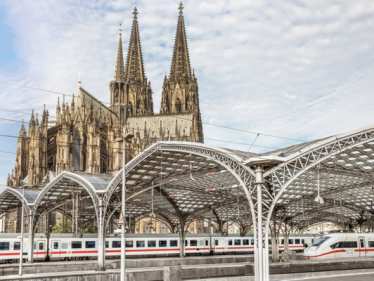
Public transport in Cologne
KVB runs the city’s transport network, spanning trams, buses and trains. The same tickets can be used across all three, bought on the app or at ticket machines. Single tickets start at €2.50, but if you’re taking more than three journeys, it’s worth getting a 24-hour pass (€8.50). For tourists, the KölnCard is another excellent option (€9 for 24 hours), giving you discounts on museums, tours and more, as well as unlimited travel. Children under six travel free, with discounted rates for six to 14-year-olds. Running from April to October, the KölnerSeilbahn cable car across the Rhine isn’t part of the network, so you’ll need to buy a separate ticket.
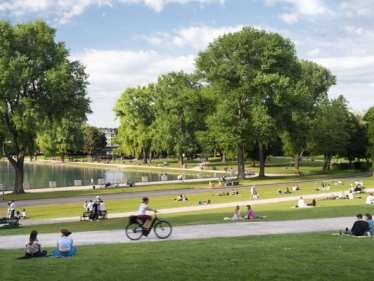
Walking and cycling
Cologne’s very pedestrian friendly – and you’ll see way more of the city if you take your time and go on foot. The Alstadt (Old Town) has several pedestrianised zones, including the Alter Markt, while shop-lined Schildergasse is also car-free. Freewalk Cologne offers daily walking tours in English, German and Spanish – just contribute what you can. Exploring on two wheels is easy, too, with a good network of cycle paths; show your Eurostar ticket at Radstation Köln for discounts on bike hire and tours. Head to green spaces like Hiroshima-Nagasaki park, or freewheel along the Rhine’s broad banks, looping back at the steel-strung Rodenkirchen bridge for a longer ride.
FAQs
Take a direct Eurostar train from Brussels to Cologne in just 1 hour 50 minutes or from Paris to Cologne in 3 hours 50 minutes. Or take the London to Cologne train journey and change in Brussels.
Yes, other German Eurostar destinations include Düsseldorf, Aachen and Essen.
Its soaring Gothic cathedral is the city’s headline attraction. Other must-sees include the Museum Ludwig, famed for its Picassos and Pop Art, and the verdant Flora and Botanical Garden, which is free to visit. Rheinau Harbour is another essential stop – and home to the ever-popular Lindt Chocolate Museum.
This is a city with year-round appeal. In the weeks before Easter, Carnival is not to missed, while summer means balmy afternoons in parks and beer gardens. In the Autumn, hunker down in cosy cafés and beer halls, or come in winter to hit the Christmas Markets.
Fill up on pork knuckle and potato dumplings, or Himmel un Ääd (black pudding, mash, fried onions and apple purée). For something a little lighter, nibble a reibekuchen: a golden, grated-potato pancake, served with a side of apple sauce.
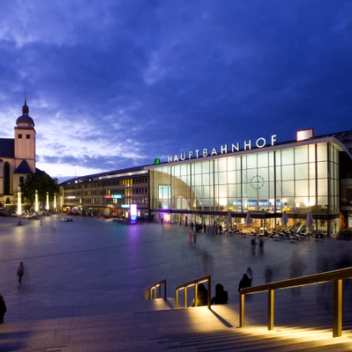
Practical info
Address: Trankgasse 11, 50667
Finding your way: See map (opens a PDF) to orientate yourself when you arrive.
Phone number: +49 221 1411055
Facilities: Car park, bike park, luggage lockers, free wifi
Lost and found: If you’ve lost something on your journey please see the advice here.
Public transport: On Eurostar’s trains across Belgium, France, the Netherlands and Germany you can buy your ticket for public transport at the Eurostar Café, at the same price as buying a single ticket at the ticket desk. Search for details of your onward journey using public transport.
Connecting trains: Check timetables in real time for your connecting trains
Airport connections: Cologne Bonn Airport
You may also like
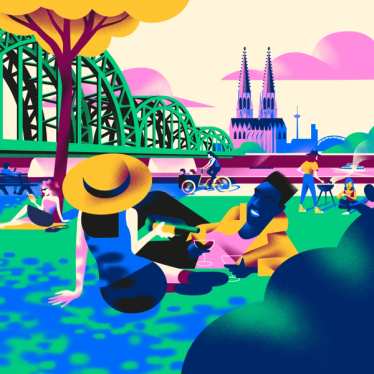
London to Cologne trains
Discover all the reasons why you should travel on the Eurostar London to Cologne train.
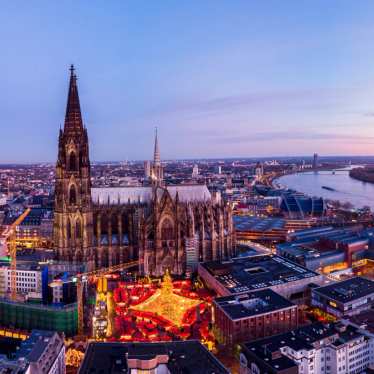
Christmas markets in Cologne
A little further afield, but well worth the trip for its traditional, festive atmosphere.

Eurostar destinations
Between Amsterdam's canals, Paris' botanical gardens, Bruges' architecture, and London's royal parks, Eurostar has something for everyone.





